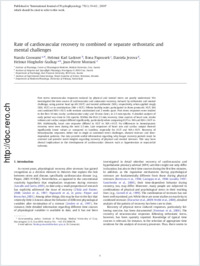Rate of cardiovascular recovery to combined or separate orthostatic and mental challenges
- Goswami, Nandu Institute of Physiology, Center of Physiological Medicine, Medical University, Graz, Austria
- Lackner, Helmut Karl Institute of Adaptive and Spaceflight Physiology, Graz, Austria
- Papousek, Ilona Department of Psychology, Karl Franzens University, Graz, Austria
- Jezova, Daniela Institute of Experimental Endocrinology, Slovak Academy of Science, Bratislava, Slovakia
- Hinghofer-Szalkay, Helmut Institute of Physiology, Center of Physiological Medicine, Medical University, Graz, Austria - Institute of Adaptive and Spaceflight Physiology, Graz, Austria
- Montani, Jean-Pierre Department of Medicine/Physiology, University of Fribourg, Switzerland
-
03.12.2009
Published in:
- International Journal of Psychophysiology. - 2010, vol. 75, no. 1, p. 54-62
Mental arithmetic
Head up tilt
Cardiovascular reactivity
Blood pressure
Heart rate
Sympathovagal balance
Hypertension
English
Post stress neurovascular responses induced by physical and mental stress are poorly understood. We investigated the time course of cardiovascular and autonomic recovery, induced by orthostatic and mental challenge, using passive head up tilt (HUT) and mental arithmetic (MA), respectively, when applied singly (MA, HUT) or in combination (MA + HUT). Fifteen healthy males participated in three protocols: HUT, MA and combined MA + HUT, with sessions randomized and 2 weeks apart. Post stress responses were studied in the first 10 min (early; cardiovascular only) and 30 min (late), in 2.5 min epochs. A detailed analysis of early period was done in 30 s epochs. Within the first 2.5 min recovery, time courses of heart rate, stroke volume and cardiac output differed significantly, particularly when comparing HUT vs. MA and MA + HUT vs. MA. Additionally, heart rate response differed in HUT vs. MA + HUT. No differences in hemodynamic recovery were seen during the next 2.5 min. Late responses of heart rate and cardiac output showed significantly lower values as compared to baseline, especially for HUT and MA + HUT. Recovery of hemodynamic responses, either due to single or combined stress challenges, showed stressor- and time-dependent patterns. Our data provide useful information regarding why longer recovery periods must be assessed and provide novel insights regarding recovery of physical and mental stressors. This may have clinical implications in the development of cardiovascular diseases such as hypertension or myocardial ischemia.
- Faculty
- Faculté des sciences et de médecine
- Department
- Département de Médecine
- Language
-
- English
- Classification
- Biological sciences
- License
-
License undefined
- Identifiers
-
- RERO DOC 17291
- DOI 10.1016/j.ijpsycho.2009.11.005
- Persistent URL
- https://folia.unifr.ch/unifr/documents/301484
Statistics
Document views: 111
File downloads:
- pdf: 274
